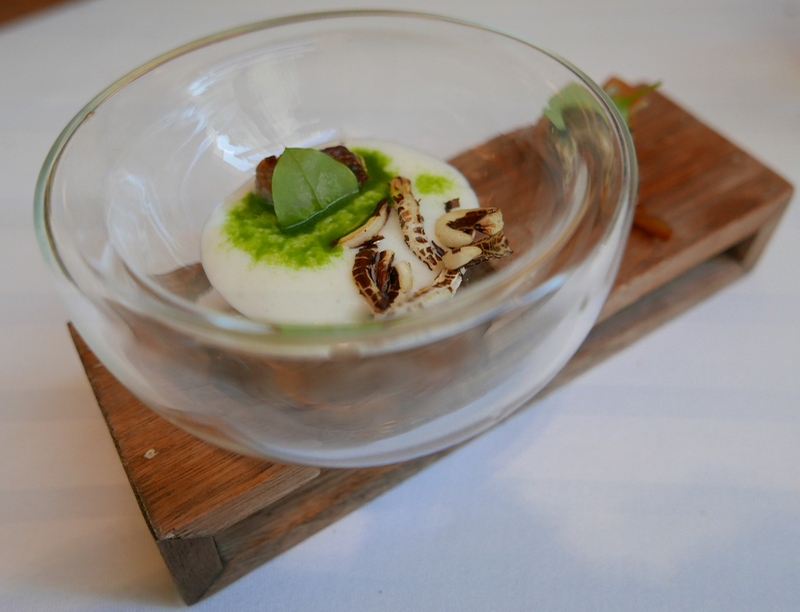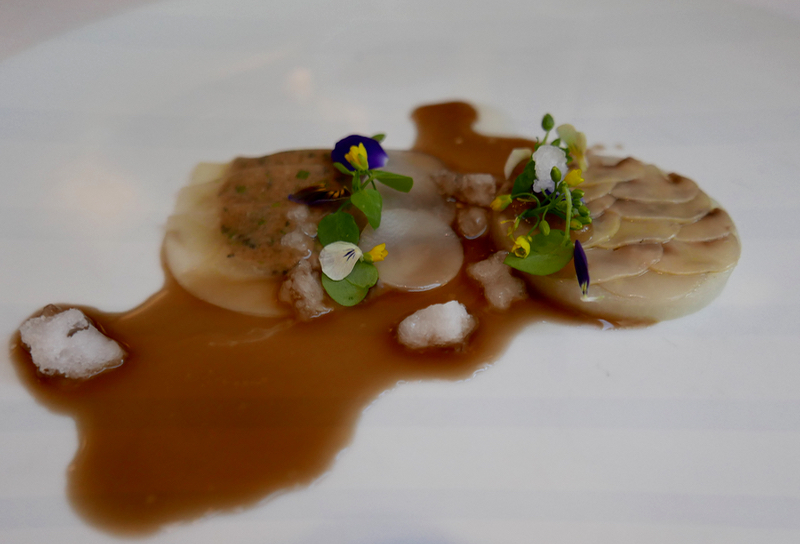Tian Vienna: vegetarian gastronomy with naturalistic wine pairing to match the best plant-cuisine in Europe
Tian is the model of success for the vegetarian gastronomy not just in Vienna, but for all Europe. The chef de cuisine Paul Ivić, winner of the Trophée Gourmet À la Carte, deserves more than one Michelin star. His exquisite, plant-centric, tasting menus star seasonal vegetables in inventive, beautifully presented contemporary plates. Non-vegetarians also often dine at Tian since the superb gourmet experience balances their lifestyle. Doctors and research agree that less animal protein in our diet is beneficial to all. An increased conscience is a bonus. Austrians are now open to eschew fish and meat once in a while.
The eclectic interior radiates Viennese grandeur with contemporary nuances. An ornamental stuccoed high ceiling with oval mirrors were jazzed up with rustic chandeliers and green plants hanging on the walls. The street-level dining room shines through its refreshing 19th century elegance. In contrast, the bar with tables and more private seating bellow the ground feels more clubby.
For a dry night out Tian offers non-alcoholic beverage pairing
Healthful purists will not miss anything by skipping the non-alcoholic beverage pairing at Tian, and sip along the bottled water from nearby Austrian Alps. I do not advise the non-alcoholic tasting ‘Tian Refresh”. Most of the blends are too sweet and rather spoil than enhance the dishes. Earth of verjus with verbena or Shrub from pomegranate and sitherwood sound exotic, but water paired better. With each new course, my mocktails had accumulated on the table. Despite my Asian jet lag I sipped from my husband’s glasses of wine. I was pleased not to miss the wonderful red Styrian Ex Vero 2008 vintage by Werlitsch.


Wine pairing experience at Tian
If you like wine, ready yourself for a palate opening tasting. Savouring the water of the gods at its purest, the organic, demeter (biodynamic certification in Europe) or natural wines promoting sommelier will introduce some quirky vinous bottlings.
Tian offers two wine pairing options. My adventurous soul is the suitor of the unknown, so I went for “Experience Wine“. With each course or you can opt for a new glass or with every other course if you want to guard your daily allowance. Liquid pleasures from more adventurous, small producers such as Alexandre Bain from the Loire or surprises like the old clones of Furmint and Harslevelu blend by a Hungarian Attila Homonna excited us.The later was made dry not sweet like the typical Tokaj, fermented and aged in used large barrels. This wonderful wine naturally expressed its salty mineral and lively, dry, sherry-like acidity of the volcanic soil in which it was grown. No chemical spray dripped on the vines.
Another highlight was the white blend Joiser Reben made for Tian by Markus Altenburger in Neusiedlersee southeast of Vienna. Classic Wiener gemischter Satz by Uhler winery in Vienna was as easily drinkable as is typical for these simple local blends, but organic. The 2013 red Trenzado, Suertes del Marques from the volcanic Tenerife island in Spain is my longtime favourite.
The sommelier further offered a biodynamic French Gamay instead of the heavier St. Laurent & Blaufrankish grown in the nearby Neusiedlersee featured in the tasting. The wine experience is customised to your liking.
A pink, slightly bittersweet vermouth made by Peter-Juranitsch-Andert was served with the desserts, but again I opted for a German Spätlese by Joh. Jos. Prüm that my husband had included in the ‘Signature Wine’ pairing. A dry Kabinett by Prüm, Ornellaia 2001, established Bordeaux (such as Château Pape Clement) or Premier Cru Burgundy pop out on this fancier menu.
Feel the food and get into the slow mood
As the jazz music quietly hums in the background, the pleasant and very professional servers gently flow into a slow food sequence. Dining at Tian is a decelerating, mindful experience in the fast urban world we live in. Drop your anxieties at the doorstep and give in to the unknown, where local ingredients meet culinary curiosity in the exquisite ‘Signature Taste by Paul Ivić’ menu and his team in Vienna.
Only tasting menus are on call at Tian. Accommodating dietary restrictions, you have flexible choices between six, eight or ten small courses in ‘Tian Experience Taste’. Vegetable-centred two starters, a duet of soups as you never had them, two a bit larger veggie mains, two cheese variations and two desserts to choose from. Pick what you want for your preferred number of courses.
An amouse-bouche of marinated mushroom tasting like a scallop, puffed rice and cream cheese emulsion was served in a glass jar with raw mushroom tartare on a fried root cracker with kombucha vinegar.
A garlic roll and crackers were served with flax seeds, Italian and Austrian olive oils and salt flakes poured into glass laboratory tubes. Most of the plates at Tian are finished on the table in front of you. Involving three steps, the art on the plate is presented in its pure state before sauces, broths, soups, or liquid chocolate spoil the form, but complement the taste. The two soup courses pay homage to the Austrian tradition of soup before the main course. Authentic and extraordinary. During our initial visit we detected cinnamon in most of the dishes, but ever since the flavours were more diversified.
The uniquely flavoured soups were a stroke of genius by the chef. The Central European tradition of having soup before the main meal is elevated at Tian into concentrated expressions of plant infused pleasure. Perhaps only Alain Ducasse and chefs of his renown can deliver such a complex yet pure liquid delight. Both, the Tea infused verdant nettle and spinach broth, and the bolder Potato with mizuna shoots and a juniper kick were by a tiny flick the best plates of the tasting menu. More, we agreed that these were the most interesting, delicious soups we have had to date.

Yet, we could not discount the joy delivered by the Fava Bean with morel mushrooms and black poplar shoots and the Fiss’ Barley sauce with spruce and soft egg that came later. The main larger portion of grated Celeriac in a cream cloth of green cress and woodruff (in Germany traditionally steeped wine to add flavour), like a rich meaty tartare was the heaviest dish of the night. I liked more the Marshfield white smoked Asparagus with a cream laden asparagus sauce, peas and bishop’s weed.
The pastry chef keeps his desserts quite similar over a long period. The Bean to Bar grand cru chocolate cake (Piura Porcelana) with cocoa-like Amazonian cupuacu fruit was finished with a pour over of a dense liquid chocolate. A liquorice brach with raw cocoa nibs served with it was an edible play to nibble on in between. The Thai flavours evoking Pandan Cereal with granola and coconut was an outlier, straying from the smooth flow of the service, but still very good. Most recently, Don’t Call Me Donut: Udzungwa, rhubarb and wild rice was indeed a different beast from a greasy donut.
Tiny sweet teasers are offered with tea or coffee at the end.

The flawless menu could benefit from a more efficient beverage service and a more precise English explanation of each dish by the staff. The chef Paul Ivić should be rewarded for his outstanding contribution to the gastronomic, vegetable-centric movement that now sways over the world. His food is better than any vegetarian or vegan restaurant I have tried globally – from Jean Georges’ ABCv, Dirt Candy and the vegan kaiseki (shojin ryori) Kajitsu New York, LA’s Crossroads by Tal Ronen, Plant food & wine by Matthew Kenney in Miami, King’s Joy in Beijing to Milan’s Michelin stared Joia and even the three star Parisian institution L’Arpège by Alain Passard. Tian in Vienna is showing the highest level of culinary sophistication from the vegetal world. Now, with his second restaurant in Munich and more casual veggie bistros* around Vienna, the awareness of excellent, more sustainable dining is deeply planted by the Tian group in Central Europe.
*Tian bistro Am Spitelberg for the best evening atmosphere, while Tian Bistro inside the Kunsthaus Wien museum embodies the nature adoring spirit of the Austrian architect and eco activist Friedensreich Hundertwasser who designed it. There, under the organically curved ceilings, you must order the exquisite Flamkuchen (known as Tarte flambée in Alsace) flatbreads.
















































